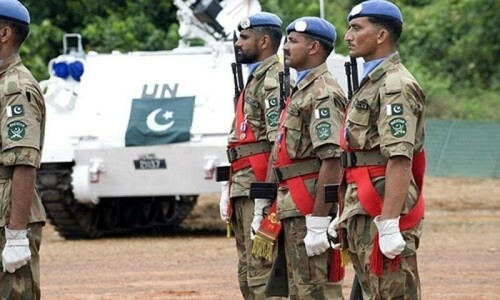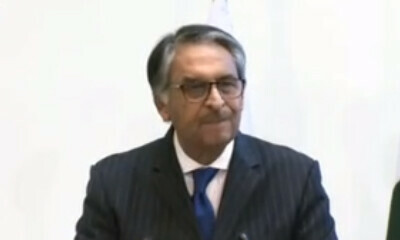
KAMANYOLA: The United Nations on Wednesday kicked off the withdrawal of MONUSCO peacekeeping forces from the Democratic Republic of Congo by handing over a first UN base to national police, an AFP team saw.
During an official ceremony at the Kamanyola base, close to the Rwandan and Burundian borders, the flags of the UN and Pakistan, the country of origin of the peacekeepers in charge, were replaced by those of the DRC.
The DRC demanded the withdrawal despite UN concerns about rampant violence in the east of the country.
Kinshasa considers the UN force to be ineffective in protecting civilians from the armed groups and militias that have plagued the east of the vast country for three decades.
UN force set to leave its 14 bases and hand them over to DRC security forces before May
The UN Security Council voted in December to accede to Kinshasa’s demand for a gradual pullout by the MONUSCO mission, which arrived in 1999. The UN force currently fields around 13,500 soldiers and 2,000 police across the three eastern provinces of Ituri, South Kivu and North Kivu.
The “disengagement plan” is due to take place in three phases with completion depending on regular assessments.
Phase one is to see the departure of military peacekeepers from South Kivu by the end of April and civilian staff by June 30. Before May, the UN force is to leave its 14 bases in the province and hand them over to DRC security forces.
It’s a “historic moment”, interim MONUSCO commander in chief Diouf Khar said in a speech. “We began with Kamanyola because there is stability here which allows us to leave,” the head of MONUSCO Bintou Keita told reporters.
After South Kivu, the second and third pullout phases will cover Ituri and North Kivu, with regular assessments of progress.
DRC Foreign Minister Christophe Lutundula has made it clear he wants the withdrawal completed by the end of this year, though the UN Security Council has not fixed a date.
‘Security vacuum’
The UN has insisted the DRC security forces must be reinforced and take care of civilians at the same time as MONUSCO pulls out.
Around six million people have been displaced by the fighting in DRC.
In Kamanyola, with a population of about 100,000, opinions appeared divided on the eve of the first step in the pullout. Ombeni Ntaboba, head of a local youth council, said he was not too concerned.
Every evening, he said, “we see them out in their armoured vehicles around the Ruzizi plain”, where armed groups operate along the border.
“But the level of insecurity is still the same, with armed robberies and kidnappings.”
“We salute the Congolese government’s decision,” said Mibonda Shingire, a rights activist, who admitted fearing the impact on the local economy because of the many people employed by MONUSCO.
Others, like Joe Wendo, said they were worried about a “security vacuum” once the Pakistani troops deployed to Kamanyola have gone.
“Their presence at least protected us from the Rwandan invaders,” he said.
The withdrawal comes with North Kivu facing the resurgent Tutsi-led M23 rebels who have seized swathes of territory.
Intense fighting resumed last month around the city of Goma, North Kivu’s capital. But local people shout down the UN troops more than they praise them.
And MONUSCO has recently felt the need to point out that it “supports Congo’s armed forces… defends its positions… facilitates secure passage for civilians”.
“The departure of the MONUSCO blue helmets concerns us, at a time when the country is at war with the rebels backed by our Rwandan neighbours,” said Beatrice Tubatunziye, who leads a development association in Kamanyola. She said she wanted to believe that Congolese forces “will quickly be able to fill the void”.
Kinshasa, the United Nations and Western countries say Rwanda supports M23 in a bid to control vast mineral resources in the region, an allegation Kigali denies.
Published in Dawn, February 29th, 2024













































Dear visitor, the comments section is undergoing an overhaul and will return soon.